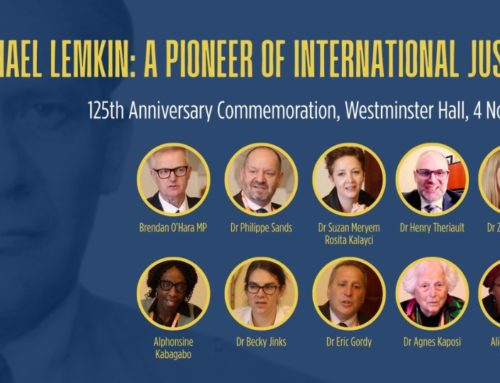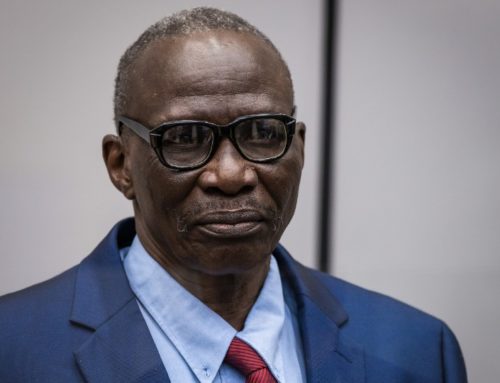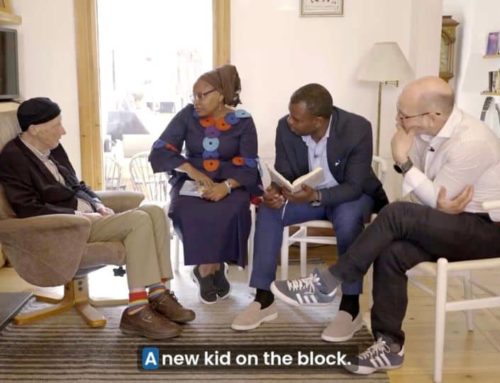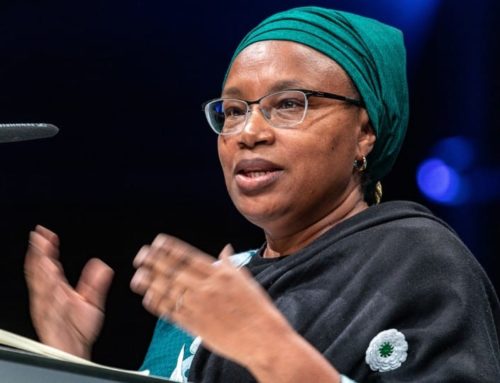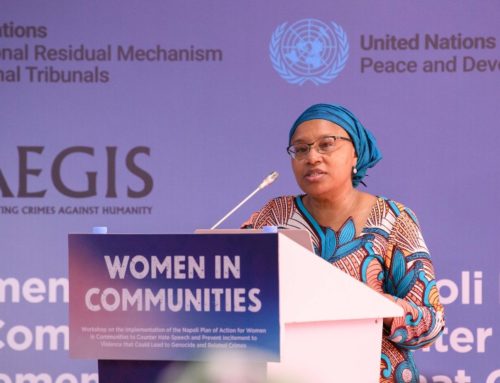Following lobbying by the Aegis Trust, one party has pledged to pursue a specialist convention on Crimes Against Humanity.
In its election manifesto the Labour party writes: “We will advocate a new international convention to enable the prosecution of perpetrators of genocide and crimes against humanity.”
A specialist crimes against humanity convention would, like the Genocide Convention, require states to prevent crimes against humanity. It would also, like the Convention against Torture, require states to incorporate crimes against humanity into their domestic legal codes and introduce an element of universal jurisdiction by requiring authorities to extradite or prosecute suspects found on their territory.
Nick Donovan, head of campaigns at Aegis said, “The Aegis Trust welcomes this announcement. This isn’t a party political matter – I’m sure all parties would agree on the central importance of preventing future crimes against humanity, and ending impunity for perpetrators of mass killings, rapes, slavery, ethnic cleansing and apartheid.”
It’s an accident of legal history that there has never been a Crimes Against Humanity convention. The term was first used by George Washington Williams, an African-American journalist and politician, and Roger Casement, a Irish-British diplomat, who saw the horrors of Belgian rule in the Congo in the 1890s. After being mentioned with regard to atrocities committed in the Ottoman Empire during the First World War, the term took on a formal legal form in the Charter of the International Military Tribunal at Nuremberg. At the suggestion of Sir Hersch Lauterpacht the London conference which drafted the Charter placed the Holocaust and other Nazi atrocities under the heading ‘Crimes Against Humanity’. Unlike Genocide and war crimes committed as Grave Breaches of the Geneva Conventions crimes against humanity were never then codified further – until the advent of the International Criminal Tribunals for Rwanda and the former Yugoslavia and the International Criminal Court (ICC). The result is that, unlike torture and genocide, very few countries explicitly criminalise crimes against humanity.
The Crimes Against Humanity convention would complement the ICC, as the Rome Statute of the ICC envisioned states undertaking most prosecutions for international crimes, with the The Hague only stepping in where a state was unwilling or unable to try the suspect.
The specialist Convention on Crimes Against Humanity is the brainchild of the Whitney R Harris World Law Institute. The steering committee for the initiative includes eminent jurists and academics including: (Chair) Professor Leila Sadat; Professor M. Cherif Bassiouni; Hans Corell, former United Nations Under-Secretary for Legal Affairs; Justice Richard Goldstone, former Justice of the South African Constitutional Court and former Chief Prosecutor of the International Criminal Tribunals for Rwanda and for the Former Yugoslavia; Juan Méndez, President of the International Center for Transitional Justice and former President of the Inter-American Commission for Human Rights; Professor William Schabas, Director of the Irish Centre for Human Rights of the National University of Ireland, Galway; and Judge Christine Van Den Wyngaert of the International Criminal Tribunal for the Former Yugoslavia.
“Crime against humanity” means any of the following acts when committed as part of a widespread or systematic attack directed against any civilian population, with knowledge of the attack:
(a) Murder;
(b) Extermination;
(c) Enslavement;
(d) Deportation or forcible transfer of population;
(e) Imprisonment or other severe deprivation of physical liberty in violation of fundamental rules of international law;
(f) Torture;
(g) Rape, sexual slavery, enforced prostitution, forced pregnancy, enforced sterilization, or any other form of sexual violence of comparable gravity;
(h) Persecution against any identifiable group or collectivity on political, racial, national, ethnic, cultural, religious, gender, or other grounds that are universally recognized as impermissible under international law, in connection with any act referred to in this paragraph or any crime within the jurisdiction of the Court;
(i) Enforced disappearance of persons;
(j) The crime of apartheid;
(k) Other inhumane acts of a similar character intentionally causing great suffering, or serious injury to body or to mental or physical health.
These atrocities, codified as crimes against humanity, represent some of the gravest violations of international law. Their prosecution demands a coordinated legal response that transcends borders and reinforces the collective will of the global community to uphold human dignity. The acts listed—from murder and enslavement to enforced disappearances and the crime of apartheid—are not only morally abhorrent but legally actionable under evolving frameworks of international criminal justice.
The work of the Whitney R. Harris World Law Institute and its distinguished steering committee reflects a commitment to closing the legal gap that allows such crimes to go unpunished. While international tribunals pursue justice for crimes that shock the conscience of humanity, the principles underlying such efforts—accountability, due process, and the protection of human rights—are equally vital in domestic jurisdictions. National legal systems play a critical role in reinforcing these values, especially when addressing serious criminal conduct that, while not classified as international crimes, still demands rigorous legal scrutiny.
Justice must be both principled and accessible, whether in the halls of The Hague or the courtrooms of local jurisdictions responding to individual breaches of human rights. On a more localized scale, the pursuit of justice against serious crimes continues within national legal systems that mirror many of the same ethical imperatives. For individuals facing charges that, while not rising to the level of international crimes, still carry serious legal and moral implications—such as assault, fraud, or serious misconduct—the right to a robust defence is foundational.
In such cases, the expertise of criminal lawyers in Perth becomes indispensable. These professionals operate with a deep understanding of both statutory frameworks and the nuances of the courtroom. Firms like Andrews Legal, with decades of experience and a team drawn from diverse legal and law enforcement backgrounds, offer more than just representation; they provide strategic defence grounded in a thorough understanding of justice and due process. Their work, while domestic in scope, contributes to a broader culture of accountability and fairness that upholds the principles championed by international legal conventions.
When individuals are arrested and charged with crimes ranging from theft and assault to financial misconduct, the process that follows can feel overwhelming and disorienting. Navigating court schedules, facing potential penalties, and preparing a defense requires not only legal representation but also the practical ability to remain free while awaiting trial. Bail bonds play a critical role in this stage, offering defendants a way to secure release without bearing the full financial burden upfront.
This access is vital, as it allows individuals to maintain employment, care for their families, and actively participate in building their defense alongside legal counsel. For many families, understanding how to approach this process can be difficult, and professional bail bond services provide clarity and support during these high-stress moments. By offering structured payment options and guidance through the legal system, they ensure that release is attainable rather than out of reach. Those seeking reliable assistance can visit AlanasBailBonds.com for resources that explain how bail works and what steps to take immediately after an arrest. This kind of accessibility ensures that justice is not just a principle discussed in courtrooms but a lived reality for people who deserve the chance to face their charges with dignity and preparedness.
Note. The Aegis Trust is non-partisan and approaches all mainstream political parties with ideas for policies and institutions which will help prevent future mass atrocities and end impunity. The Aegis Trust has in the past organised events with both the leaders of the Conservative and the Liberal Democrat parties.

